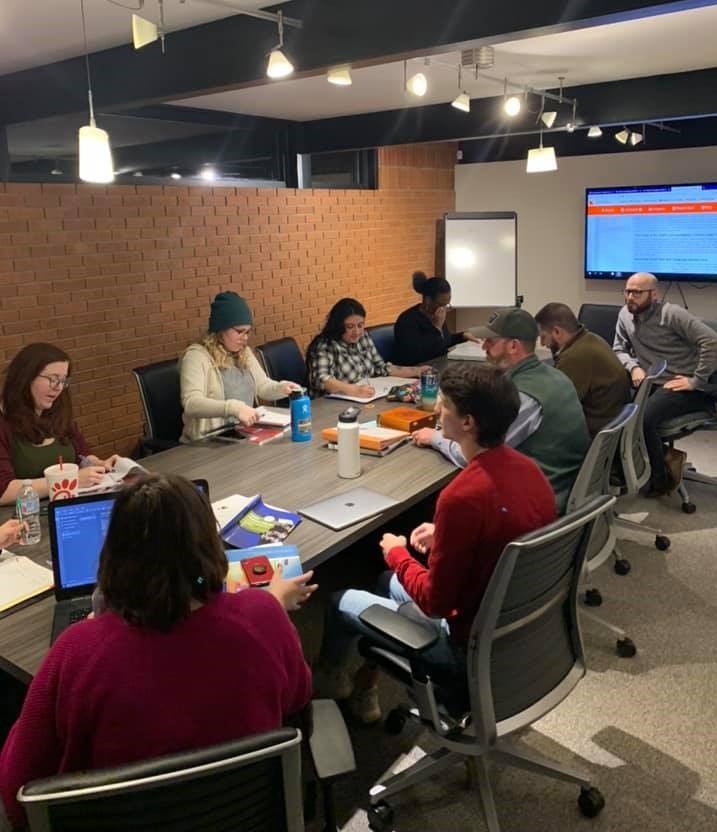
Students in the College of Education and Health Professions recently created a comprehensive counseling program for Hope Academy of Northwest Arkansas, a new school for children who have experienced trauma.
"We created their entire school counseling program, beginning with the school counseling mission and vision, needs assessments, and counseling classroom lessons and small group lesson plans to address trauma related behaviors and more," said Kristi Perryman, assistant professor of Counselor Education and Supervision at the University of Arkansas.
The American School Counseling Association outlines the duties of the professional school counselor. Arkansas' comprehensive program is based on these guidelines and is actually a law in the state.
"Senate Bill 199 passed last year, which is the strongest school counseling law in the country," Perryman said. "Counselors must spend 90% of their time in indirect and direct services to students."
The Arkansas Department of Elementary and Secondary Education is requiring that the first self-study reports associated with this new bill are submitted in August. The Hope Academy School Counseling Program's self-study will be submitted then. The tuition-free, open-enrollment, public charter school is expected to open this fall in Bentonville.
Assisting Hope with opening requirements also helped U of A counseling students.
"Students obtained first-hand experience to prepare them to be able to do this as school counselors and offer a needed service to our community at the same time," Perryman said.
Their efforts included meeting with the principal and school counselor at Hope to outline the needs at the school and create the needed curriculum and smart goals as well as methods to assess.
"Graduating from the University of Arkansas with this knowledge will serve them well as they search for jobs since current Arkansas counselors are just now learning how to complete the self-study process for the first time," Perryman said.
Jake Gibbs, the principal at Hope, said having the support of Perryman and U of A students has been invaluable.
"The workload they took on and the expertise they provided were an absolute necessity as we developed the social and emotional component of the school," he said. "As a small startup charter school, it has been encouraging to work with a team of people who share our vision for creating a unique environment for students who have experienced significant trauma."
Gibbs said the counseling and therapy component of Hope is the most fundamental and being able to collaborate and share ideas with the team at the U of A helped round out the program in preparation for the first school year.
Ellen Bennett, who will serve as Hope's school counselor, said, "It has been helpful and encouraging knowing that there are a group of students willing to contribute to developing a strong foundation for the counseling program. It has also provided me with a lot of hope going forward, that I can turn to so many individuals for support to better provide extra resources for each child's unique journey at Hope Academy."
Perryman said helping a new school get its counseling program up and running was equal parts challenging and exciting.
"Since there is no current data on the school, we had to research trauma-related behaviors in depth as well as ways for the school counselor to address these needs through their comprehensive program," she said. "With existing schools, the achievement gaps can be easily identified through existing data such as attendance, office referrals, and academic achievement and the lessons and smart goals are planned accordingly to meet these gaps."
Much of the self-study work had to be completed via Zoom, but students were able to present their plan to the school last week.
One of the students, Monica Vallejo, said she's grateful for the rare opportunity to develop a counseling program for a new program.
"We were able to use our skills in research, critical thought, and the use of the ASCA model first hand in a real world situation," she said. "We practiced collaboration and consultation in a legitimate and constructive way—which will carry considerable weight in our academic and professional careers."
Vallejo said she's most grateful to have gained valuable insight into the impact trauma has on the development of children and on their learning experience.
"We learned to observe and identify behaviors we could have overlooked or misidentified—giving a new meaning to what Dr. Perryman always advised, 'behavior is purposeful,'" she said. "Understanding the value of integrating a trauma-informed approach in the classroom will be immensely beneficial for us as counselors and for the students we serve in any school setting."
About the College of Education and Health Professions: The College of Education and Health Professions offers advanced academic degrees as well as professional development opportunities and learning communities in service to the education and health systems of Arkansas and beyond. The college provides the education and experiences for a variety of professional roles, ranging from community mental health counselors to school teachers and leaders. Programs in adult and higher education, along with educational technology and sport management, offer a broad range of options. In addition to education-related opportunities, the college prepares nurses, speech-language pathologists, health educators and administrators, recreation professionals, rehabilitation counselors and human performance researchers.
Topics
Contacts
Shannon G. Magsam, director of communications
College of Education and Health Professions
479-575-3138, magsam@uark.edu